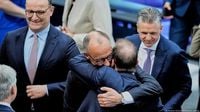In a dramatic turn of events on May 6, 2025, Friedrich Merz was elected as the tenth Bundeskanzler of Germany after a tumultuous first round of voting left him without the necessary support. The election, held in the Bundestag, showcased the increasingly complex political landscape of Germany, where not even the leader of the CDU could secure a straightforward victory.
During the first round of voting, Merz received 310 votes in favor, while 307 voted against him, falling short of the required 'Kanzlermehrheit' of 316 votes. Parlamentspräsidentin Julia Klöckner announced the results shortly after 10 AM, stating, "The member Merz has not achieved the required majority of 316 votes and is therefore not elected as Bundeskanzler." This outcome marked a historic moment, as it was the first time in the history of the Federal Republic that a chancellor candidate did not secure the necessary majority in the first ballot.
Despite the setback, Merz quickly announced his intention to run again. In the second round, he successfully garnered 325 votes, with 289 against him. A visibly relieved Merz expressed gratitude for the trust placed in him, stating, "I thank you for the trust and accept the election." This victory, however, came after a period of uncertainty and speculation regarding his leadership.
The political atmosphere leading up to the election was fraught with tension. Polling data indicated that Merz was losing popularity, with only 38 percent of Germans supporting his election as chancellor, while 56 percent opposed it. This decline in support was reflected in his ranking among politicians, where he fell from twelfth to thirteenth place, as reported by an INSA opinion trend commissioned by Bild. Meanwhile, SPD leader Lars Klingbeil saw an increase in popularity, moving up to third place in the same ranking.
The political landscape was further complicated by the presence of the AfD, which has been classified as 'gesichert rechtsextrem' by the Verfassungsschutz. Following the election, AfD Co-Chairman Tino Chrupalla declared it a "good day" for Germany, while party leader Alice Weidel criticized Merz's inability to secure his own party's support, suggesting that it indicated instability within the government.
Merz's path to election was not without obstacles. His coalition, consisting of the CDU, CSU, and SPD, had a combined total of 328 votes, twelve more than the required majority. However, it was revealed that 18 politicians from his own coalition did not support him in the first round. This lack of unity raised questions about his leadership and the future of his government.
After the first round of voting, Merz faced a critical moment in his political career. Observers noted that the significant opposition from within his coalition could signal deeper issues regarding his leadership. Some speculate that the dissenting votes were a message to Merz, reflecting concerns over his policies, particularly regarding migration and fiscal responsibility.
As the dust settled on the election, the reactions from both sides of the political spectrum were telling. Members of the SPD expressed a desire for unity in support of Merz in the upcoming rounds, with Ralf Stegner stating, "This can’t be what anyone wants. I believe the Social Democrats know what they must do now." However, it remains uncertain how steadfast this support will be, given the divisions within the party.
Looking ahead, Merz is set to embark on his first international trips as chancellor, with visits planned to Paris and Warsaw, and a meeting with U.S. President Donald Trump. These engagements are seen as crucial for reinforcing alliances and establishing his leadership on the global stage.
In summary, while Friedrich Merz has finally taken the reins as Bundeskanzler, the circumstances surrounding his election highlight the challenges he faces in uniting a fractured political landscape. As he steps into his role, the question remains: can he navigate the complexities of German politics and restore confidence among his constituents and coalition partners?




